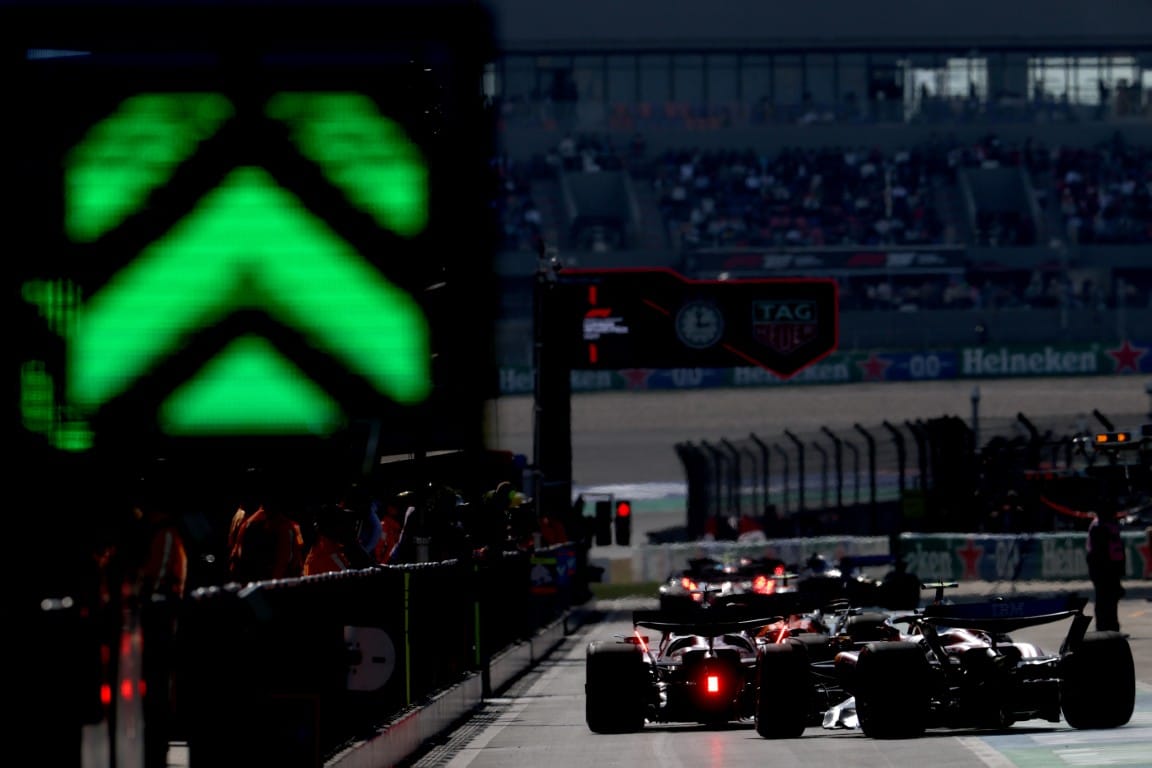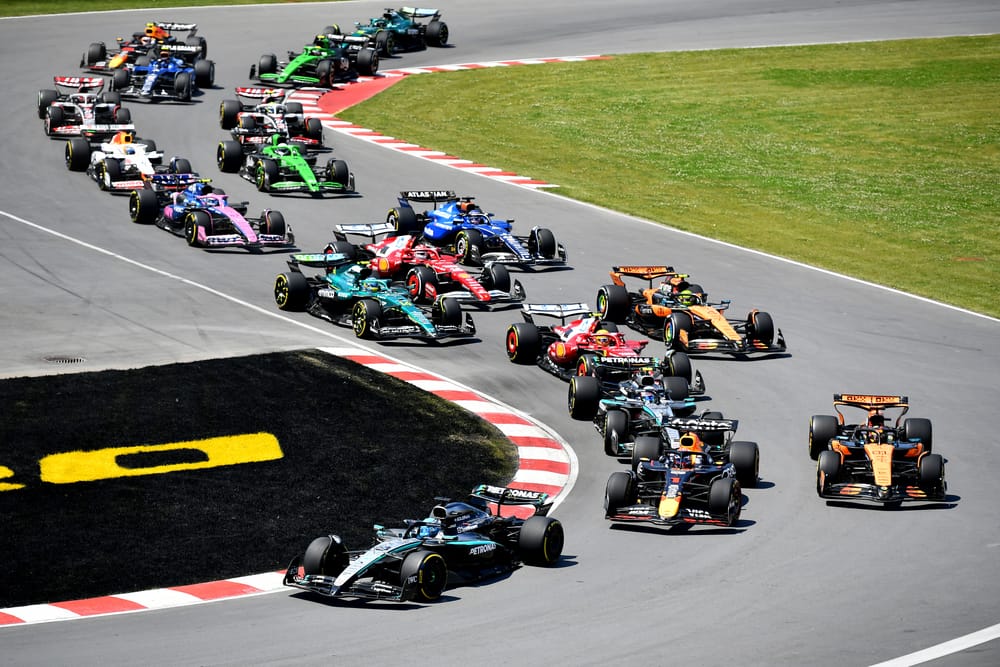Williams team boss James Vowles believes Formula 1 should look at whether a shift to a two-day weekend format would allow for a bigger calendar.
And combined with F1 CEO Stefano Domencali's repeated calls for F1 to think up more exciting alternatives to practice sessions, that's raised questions over whether F1 weekend's format needs a shake-up.
Here's what our team thinks...
Two-day weekends seem impractical
Ben Anderson
The James Vowles proposition is an interesting one, doubly so because the suggestion is coming from an F1 team boss rather than a fan or someone from the media.
Why would such an important F1 stakeholder want to see such a change? You would think it would maybe help teams save money and protect their staff by working a day less at the circuit, but probably in reality they end up cramming the same amount of preparation and pack-down into a shorter timeframe, so maybe the motive is really more about making the race weekends more challenging/exciting.
I certainly think the TV spectacle would benefit from a condensed two-day format: probably sprint qualifying and race on Saturdays; grand prix qualifying and race on Sundays. Those fans who work Monday-Friday wouldn’t miss any live action, and then each of the remaining sessions would be more meaningful while also making it more difficult for the drivers and teams to perfect their set-ups from abundant practice.
But there’s almost zero chance it happens - especially at races with a traditional promoter who relies on the Friday gate to make ends meet. Adopting the two-day weekend is essentially prioritising the remote viewer over the intrepid fan, and given the number of record crowds reported at almost every F1 event these days, I’m not sure that’s an avenue F1 management is going to want to pursue too readily.
Going to F1 races is expensive, but also a proper adventure for fans. Why rob them of an extra day’s live action and on-track entertainment?
There’s no need, really. Just have a few more sprint weekends, if that’s what the data tells you promoters and fans want to see. The TV viewer can always catch Friday ‘on demand’ if they miss it.
Why practice is important
Edd Straw
To answer this question realistically, it's necessary to understand what drives this perceived need. It's about creating more appealing 'content' for fans around the world to consume, partners to attach themselves to and, ultimately, about further growing the revenue of F1. That's the driving force for why F1 needs to do this. If it can do so in a way that enhances its sporting value, then this is merely a bonus.
Shortened events won't appeal to most promoters, but could work as a bargaining chip for expanding the number of races using the reductive argument that two-day weekends mean reducing the amount of workload by a third. That this isn't really what it means to most who work for teams is by the by.
More sprint races seem inevitable, but given that the current six sprint races are the most basic mini-prix events imaginable, it's clear there needs to be greater innovation and experimentation with formats to give them their own identity. To be fair to Domenicali and F1, there is a desire to do this, but reactionary teams have stood in the way of it. Arguing against sprints is futile at this stage - what matters is that they are made a must-see and distinctive part of the weekend and to do that requires more innovative ideas. What's more, there's no need for every sprint weekend to have an identical format, so why not mix it up more?
However, practice should not be considered a dirty word. While it's the least profitable component of track time from a financial perspective, if you want a competition of highly capable competitors both in the cockpit and in the garages, you need to give them the opportunity to work on their skills and machinery. With testing effectively non-existent, it would seem absurd to strangle the opportunities for drivers to drive ever more intensely.
This is not an argument for locking in three free practice sessions every weekend, merely that the opportunity for non-competitive running should not be considered an optional or even undesirable part of a race weekend or even season.

Take more risks with sprints
Glenn Freeman
If sprints are here to stay, then F1 needs to get braver with them. Use them to try different things out. Not only will they then serve more of a purpose in helping us learn a few things about potential race format changes, but they'll have more of a USP than they do now.
I agree with the sentiment that is endlessly pushed by F1 and broadcasters that competitive sprint-related sessions are "better than watching practice". But that's a low bar, and it should not be an excuse to leave the sprint format as it is today, where both qualifying and the race are just shorter, watered-down versions of the main event.
Sprints were sold to us as short, sharp and action-packed. They're not really any of those things. They're just a single stint of a grand prix where quite often not much happens.
Where to start with things to try? My picks would be one-shot qualifying and reversing at least part of the grid (though not on the same weekend!). One-shot qualifying feels perfect for making occasional appearances and providing a different challenge that would give us some variety in the starting order. We know from F1's dabble with it across 2003-05 that it gets tedious if you see it every weekend, but it would be interesting to see from time to time.
And as for reversing the grid, regardless of anyone's position on it, I'm tired of the debate taking place with no real-world examples. Let's give it a go in a sprint - which many hardcore fans claim not to really like anyway - and see if it's as bad as some fear, or if it might prove to be a pleasant surprise.
At least then we could all argue about it, having seen what it's really like.
More sprints and longer practice sessions
Gary Anderson
Having been involved in F1 for over 50 years, when the season consisted of much fewer races, we headed off to most of them all together (that’s eight people) in a transit van with no mobile phones and a quick peck on the cheek from the other half with a ‘see you in around a week's time’.
In terms of time away and with parc ferme and the curfew regulations, it’s not much different as far as the personnel involved are concerned, but I still think 24 is races is enough. Yes, the sprint races and the extra sprint qualifying sessions are more exciting than a practice session, so a few more sprints wouldn’t do any harm. Perhaps this could go up to 12, but I think that would be enough.
We complain about the difficulty in overtaking and are always implementing artificial ways of making it happen, like increasing pitlane speed or wider gaps between tyre compounds, but none of it works.
However, if six of those sprint races were reverse-grid events, it might just put a little pressure on the teams to build a car with more robust aerodynamics and more efficient cooling that is better in traffic.
With no in-season testing, I believe the Friday practice sessions at the events that don’t have a sprint race are important to allow the teams to get the best out of their cars.
We all know that every team has state-of-the-art simulators, but we also all know that, when it comes to it, there is no substitute for actual circuit testing.
I would even suggest that, on non-sprint weekends, the two Friday sessions be extended by half an hour to allow the teams more time to make set-up or specification changes.
The effort needs to be in making racing better (if that’s possible) rather than more of the same.
F1 teams don't need three hours of practice
Josh Suttill
Some of the best race weekends have started with a washed-out couple of Friday practice sessions, which means F1 teams go into Saturday blind and have to use all their expertise to optimise their cars with one hour of practice.
And more often than not, they do a good job. After all, these are some of the best brains in the world - they don't need three hours of practice.
Scrap Thursday, then Friday can be spent with teams carrying out media duties and fan activations, while junior categories like Formula 2, Formula 3 and F1 Academy take the on-track spotlight - maybe with some retro F1 cars thrown into the mix.
That still makes a worthwhile, sellable three-day weekend ticket for the promoters, and TV doesn't need to be short-changed, because you probably could then justify squeezing a couple more races onto the calendar - two bonus races are surely worth a lot more than even a season of practice sessions.
Someone has to lose
Jack Benyon
We certainly don't need more races - it makes having a season-long title battle narrative tough because it's not engaging over such a long period, or if there's a clear leader they have more opportunity to dominate.
And any proposal to make that happen is a bad one, unless it's replacing an FP1-3 with a sprint, because even if sprints are flawed, they're more entertaining than practice.
But I do think there could be a more fun way to structure an F1 weekend. The practice-thirsty teams just wouldn't allow it.
Some of my favourite NASCAR races have been when they've just had qualifying and the race, or gone straight into the race based on championship positions. F1 teams do enough sim work that this could be done safely in F1, and I'd love to see that from a fan perspective. But it would be a very short weekend for fans and the teams would lose their minds over that prospect. It would certainly create more of a challenge and a bit of room for some diversity in the results.
That's the problem here. You have to consider fans who pay a lot to be at events, fans who pay a lot to watch at home, and companies that pay a lot to make it happen. You can't please all of them.



